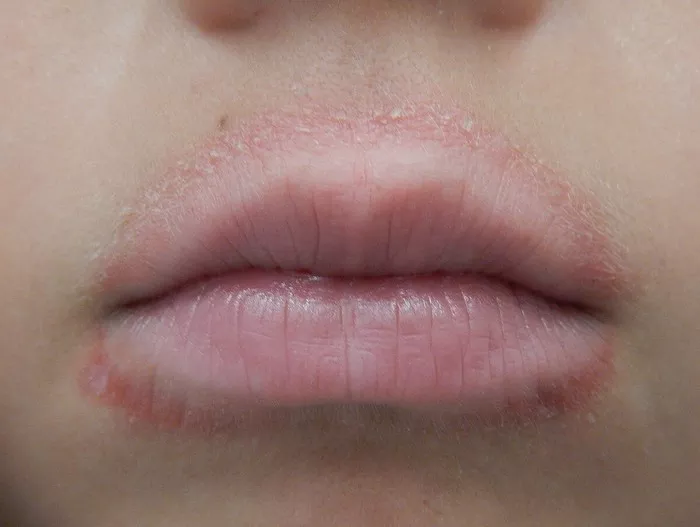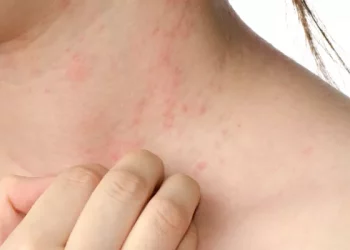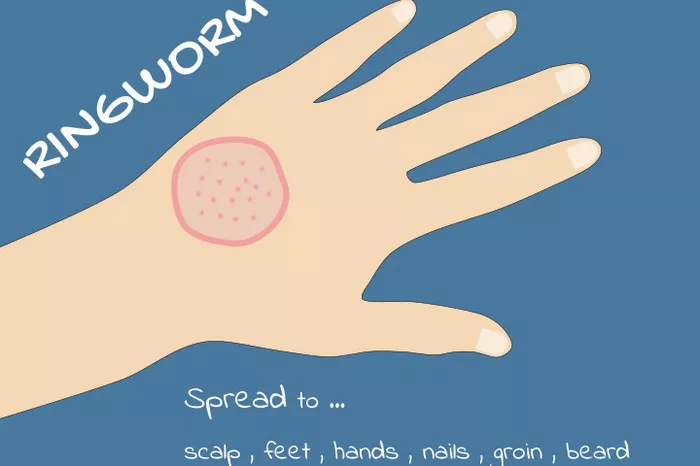Eczema around the lips is a common skin condition that can cause discomfort and frustration. It usually appears as red, inflamed patches of skin, which may be itchy, dry, or cracked. While eczema can occur anywhere on the body, the skin around the lips is particularly sensitive and can be more prone to irritation. Understanding the causes of eczema and how to manage the condition effectively can help reduce symptoms and improve the appearance of the skin.
In this article, we will explore the various causes of eczema around the lips, effective treatment options, and helpful tips to prevent flare-ups.
What is Eczema Around the Lips?
Eczema, also known as atopic dermatitis, is a chronic skin condition characterized by inflammation, redness, dryness, and itching. When it appears around the lips, it can make it difficult to eat, speak, or even smile without discomfort. The skin around the lips is particularly delicate, which makes it more vulnerable to triggers like allergens, irritants, and environmental factors.
Eczema can vary in severity. For some people, it might cause mild dryness, while for others, it can result in painful cracks and sores. Lip eczema can affect both adults and children, and it often occurs alongside other skin conditions like psoriasis or seborrheic dermatitis.
Causes of Eczema Around the Lips
Several factors can trigger or worsen eczema around the lips. Identifying these triggers is an essential step in managing and reducing flare-ups.
Allergic Reactions: Certain allergens, such as pollen, pet dander, or food ingredients, can cause an allergic reaction on the skin. Foods like citrus, nuts, chocolate, and dairy are commonly linked to allergic eczema around the lips. In some cases, cosmetic products or lip balms containing fragrances, dyes, or preservatives can also trigger reactions.
Irritants: Harsh chemicals or irritating substances can worsen eczema. Ingredients found in toothpaste, mouthwash, and even certain soaps may cause irritation when they come into contact with the sensitive skin around the lips.
Dry Skin: Lack of moisture can lead to dry, flaky skin, which may contribute to eczema. Environmental factors like cold weather, wind, and low humidity can exacerbate dry skin and trigger flare-ups.
Stress: Emotional stress is known to affect the immune system and can contribute to flare-ups of eczema. Anxiety or stress can cause an imbalance in the body’s hormone levels, leading to increased inflammation in the skin.
Hormonal Changes: Hormonal fluctuations, particularly during pregnancy or menstruation, can also affect the skin’s sensitivity. This is why some women experience more frequent flare-ups around the lips during these times.
Genetics: A family history of eczema, allergies, or asthma can increase the likelihood of developing eczema around the lips. If someone in your family has eczema, you may be more prone to developing it as well.
Symptoms of Eczema Around the Lips
The symptoms of eczema around the lips can vary in severity and may include:
Red, inflamed skin: The skin around the lips may appear pink, red, or inflamed.
Dry, flaky skin: The affected area may become dry, rough, or flaky.
Itching or burning: The skin may itch or burn, especially when it is exposed to irritants.
Cracked skin: In severe cases, the skin may crack or bleed, making it painful to move the lips.
Blisters or bumps: Small blisters or bumps may form on the skin, which can be uncomfortable and cause further irritation.
Treatment Options for Eczema Around the Lips
Treating eczema around the lips involves both managing symptoms and addressing the underlying causes. A combination of home remedies, over-the-counter treatments, and medical interventions can help reduce inflammation and provide relief.
1. Use Gentle Skincare Products
The first step in managing eczema around the lips is to switch to gentle skincare products. Avoid harsh soaps, exfoliants, or products that contain alcohol or fragrance, as these can further irritate the skin.
Fragrance-free products: Look for skincare products that are fragrance-free and hypoallergenic. This includes cleansers, moisturizers, and lip balms.
Non-comedogenic formulas: Choose products labeled non-comedogenic, meaning they are designed to not clog pores or irritate sensitive skin.
Use a mild cleanser: Instead of using harsh face washes, opt for a mild, non-foaming cleanser to wash the affected area. This will help remove dirt without stripping the skin of moisture.
2. Moisturize Frequently
Keeping the skin around your lips moisturized is essential in preventing dryness and reducing eczema flare-ups. Moisturizing helps to create a protective barrier that keeps out irritants and allergens while sealing in moisture.
Apply moisturizers regularly: Use a thick, fragrance-free moisturizer, especially after washing your face or showering. This helps lock in hydration.
Petroleum jelly or Aquaphor: For severe dryness, apply a thick layer of petroleum jelly or Aquaphor around your lips before bedtime. These products create a barrier to prevent moisture loss.
Humidifier: Using a humidifier in your home, especially in winter, can help maintain moisture levels in the air and prevent dry skin.
3. Avoid Known Triggers
If you know certain substances trigger your eczema, it’s essential to avoid them as much as possible. Keeping track of what irritates your skin can help reduce flare-ups and prevent new outbreaks.
Avoid allergens: If you suspect a food allergy is triggering your eczema, try eliminating common allergens such as dairy, nuts, or citrus from your diet. You may want to keep a food diary to identify any patterns.
Avoid harsh cosmetics: Be cautious about the cosmetics you apply around your lips. Choose hypoallergenic and non-irritating products to avoid worsening your eczema.
Limit sun exposure: While some sunlight can be beneficial for the skin, overexposure can worsen eczema. Use a lip balm with SPF to protect your lips from harmful UV rays.
4. Apply Over-the-Counter Treatments
For moderate eczema flare-ups, over-the-counter (OTC) treatments can be effective in reducing inflammation and relieving symptoms.
Hydrocortisone cream: A mild hydrocortisone cream (1%) can help reduce inflammation and soothe itching. Apply a thin layer to the affected area for a few days, but avoid prolonged use on the face as it can thin the skin.
Antihistamine creams: If itching is a significant issue, topical antihistamines such as diphenhydramine cream can help alleviate the sensation.
Barrier creams: Some barrier creams and ointments can help protect the skin around the lips from irritants and moisture loss.
5. Try Natural Remedies
Some natural remedies can complement conventional treatments for eczema around the lips. While more research is needed, many people find relief from these home remedies.
Coconut oil: Coconut oil has natural anti-inflammatory and moisturizing properties that may help soothe dry and irritated skin. Apply a small amount to the affected area after cleansing.
Aloe vera: Aloe vera gel can help calm inflammation and provide relief from itching. Apply fresh aloe vera gel directly to the skin or use an aloe-based cream.
Honey: Honey is a natural humectant, which means it helps retain moisture. It also has antimicrobial properties that may reduce the risk of infection in cracked skin.
6. Consult a Dermatologist
If your eczema around the lips does not improve with home treatments or if the flare-up is severe, it may be time to consult a dermatologist. A healthcare professional can help identify underlying causes and recommend stronger treatments.
Prescription topical steroids: In cases of severe eczema, your dermatologist may prescribe a stronger corticosteroid cream to reduce inflammation and promote healing.
Immunosuppressant medications: For chronic or widespread eczema, oral or topical immunosuppressant medications, such as tacrolimus or pimecrolimus, may be prescribed to control inflammation.
Patch testing: If your eczema is caused by an allergy, your doctor may recommend patch testing to identify specific allergens that are triggering your symptoms.
Prevention Tips for Eczema Around the Lips
While eczema is a chronic condition that may not have a permanent cure, there are steps you can take to reduce the frequency and severity of flare-ups.
Avoid frequent licking of the lips: Saliva can dry out the skin and make eczema worse. Try to avoid licking your lips, even if they feel dry.
Use a lip balm regularly: Keep a hypoallergenic lip balm with you and apply it throughout the day to prevent the skin from becoming too dry.
Stay hydrated: Drinking plenty of water helps maintain moisture levels in the skin and can prevent dehydration, which may trigger eczema flare-ups.
Manage stress: Practice stress-reducing techniques like yoga, meditation, or deep breathing exercises to help manage the emotional triggers of eczema.
Conclusion
Eczema around the lips can be a bothersome and painful condition, but with the right approach, it is manageable. By using gentle skincare products, moisturizing regularly, avoiding known triggers, and seeking professional treatment when necessary, you can effectively manage your symptoms and enjoy healthier, more comfortable skin.
If you find that your eczema does not respond to home treatments or worsens over time, be sure to consult a dermatologist for further guidance. With the right care and attention, you can reduce flare-ups and keep your skin around your lips calm and irritation-free.
Related topics:


























